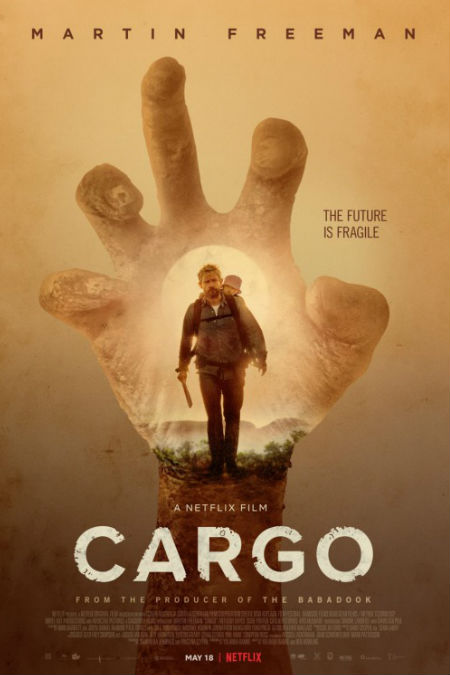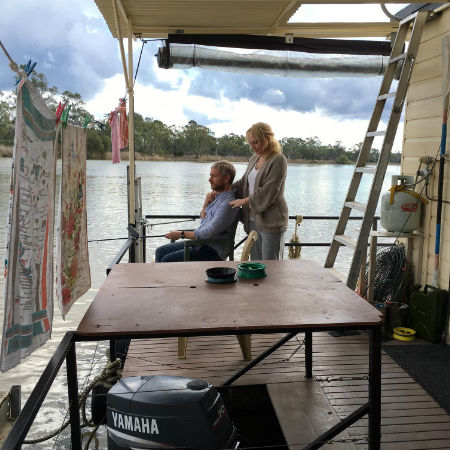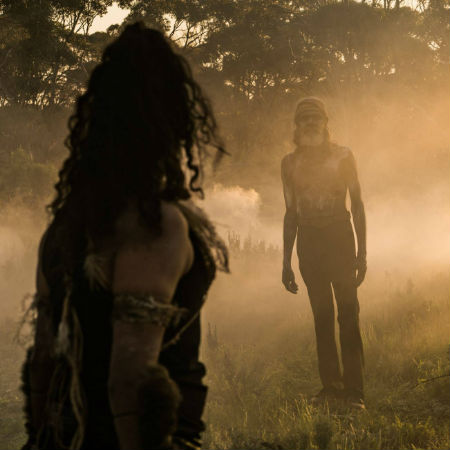
As you watch yet another hapless victim run fruitlessly from a ravenous pack of the undead, it is easy to think there is nothing new under the zompocalyptic sun.
But its obvious from the start of Ben Howling and Yolanda Ramke’s wondrously evocative and emotionally-intimate Cargo, a remark of their 2013 short film of the same name, that here is something that defies that wearied resignation.
Cargo is a film about the zombie apolcaypse which rightly realises, divertingly dramatic though the undead might be, that what really captures our heart and our undivided attention is what happens to the people left behind by the unceasing tide of animated death.
In this case, father Englishman Andy Rose (Martin Freeman), his Australian wife aka his “true blue” Kay Caine (Susie Porter) and their barely-a-toddler Rosie who are enroute to the rumoured safety of a military base upriver aboard an old riverboat, life as idyllic as it comes in the midst of the end of “normal”. (This is a reference to what character talking about what might happen once things return to normal to which Andy notes that normal has irretrievably gone.)
Idyllic, except for the husband of a riverbank family of survivors, their camp decked out like a party to divert their two young daughters from the grim reality of current circumstances (another beautiful nod to how real people would face a hitherto unreal situation), who holds up a gun in response to Andy’s waved greeting, the imminent end of their food supplies and the very real threat that they may not survive the hell around them.

It all sounds suitably dramatic, and it is, but in a quietly-understated way that defers to the way in which crises are not usually lived in the strident crests of noisy, chaotic misfortune but in the monotony in-between, in the small moments, or long stretched-out days, where partners bicker, make up, and, where, the old certainties of life, and death for that matter, are swept aside, everyone trying to work out how to survive in a world now inimically opposed to that.
Intercut with the scenes of what passes for domestic bliss in these blighted days, we see Thoomi (Simone Landers), an indigenous girl who initially looks like she is aimlessly, and somewhat in a carefree manner, wandering the empty landscape of the Australian bush.
It soon emerges, in a film that pleasingly takes its time to spin its wholly-affecting tale of humanity lost and gained, that her life is anything but childlike, her mission a grim one that hides some very real grief and dislocation.
Cargo does not rush to bring these two alternating sets of characters together but when Andy and Kay’s seemingly-perfect existence, such as it is precariously is, falls apart when first Kay then Andy gets affected – you have a 48-hour window, marked by convulsions and weird blood-craving, digging-punctuated fugue states, all counted down by a Fitbit timer – and Thoomi’s freedom is curtailed by delusionally-avaricious redneck Vic Carter (Anthony Hayes), their worlds begin to mesh in mutually-necessary and emotionally-rich ways.
The true delight of Cargo, which contrasts the way in which white and indigenous Australians react to the crisis of the undead – the differences are not delivered in any kind of heavy-handed, preaching manner with the film preferring more of a studious show-don’t-tell approach – is that it lets the raw, achingly sad humanity of the situation play in slow, calamitous fashion.
Here are lives besieged on every front, death seemingly having the upper hand over life (perhaps it has always been so?) and peoples’ reactions, their abilities to coping physically and emotionally, good and narratively-driving bad, are given room to breathe, really breathe, in a way that is never less than wholly engrossing.

You come to understand that people don’t stop being people, just because of something as world ending as the zombie apocalypse, and that impulses noble and ignoble, characters lofty and debased, remain as they were, with each dynamic playing in ways predictable and yet, for a film that happily eschews the tired trajectory of many a zombie film, gloriously and meditatively unpredictable.
In every carefully-thought out and richly-expressed scene, and it is every scene with Cargo never really putting a foot wrong in either its pacing or storytelling, characters push things forwards, or horrifyingly backwards, the zombies present and terrifying but second-players to the human drama unfolding quietly and defiantly around them.
In the end, as an infected Andy desperately tries to find someone who can look after Rosie once he’s gone, with a series of candidates such as marooned schoolteacher Etta (Kris McQuade) and effective prisoner Lorraine (Caren Pistorious) all offered as possible candidates at one point or another, Cargo is a story of love and devotion between a father and an uncomprehending infant daughter that becomes entwined with friendship with a young indigenous girl who wonders if the heart can ever heal in such a broken place.
Cargo never loses touch with the emotional truth that drives it, holding fast at every narrative turn, methodically powerful and occasionally but perfectly-placed moments of action and conflict all, to its powerfully simple but devastatingly moving narrative core.
Armed too with arresting cinematography by Geoffrey Simpson, who allows the film to inhabit its big, expansive moments and its intimate scenes with equally affecting elegance and grace, and music which seamlessly evokes the slowly-unfolding drama, Cargo is superb, a human drama inside the zombie apocalypse which defies the idea that there are no new stories to tell, and which proceeds, thus emboldened, to tell a story which ends in the most poetically, heartbreakingly way possible and yet even so, resolutely resonant with hope, a rarity in a genre where hopelessness is often the only thing on offer.